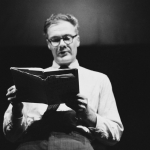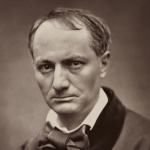An old man in Concord forgets to go to morning service. He falls asleep, while reading Vergil, and dreams that he is Aeneas at the funeral of Pallas, an Italian prince.
The sun is blue and scarlet on my page,
And yuck-a, yuck-a, yuck-a, yuck-a, rage
The yellowhammers mating. Yellow fire
Blankets the captives dancing on their pyre,
And the scorched lictor screams and drops his rod.
Trojans are singing to their drunken god,
Ares. Their helmets catch on fire. Their files
Clank by the body of my comrade—miles
Of filings! Now the scythe-wheeled chariot rolls
Before their lances long as vaulting poles,
And I stand up and heil the thousand men,
Who carry Pallas to the bird-priest. Then
The bird-priest groans, and as his birds foretold,
I greet the body, lip to lip. I hold
The sword that Dido used. It tries to speak,
A bird with Dido’s sworded breast. Its beak
Clangs and ejaculates the Punic word
I hear the bird-priest chirping like a bird.
I groan a little. “Who am I, and why?”
It asks, a boy’s face, though its arrow-eye
Is working from its socket. “Brother, try,
O Child of Aphrodite, try to die:
To die is life.” His harlots hang his bed
With feathers of his long-tailed birds. His head
Is yawning like a person. The plumes blow;
The beard and eyebrows ruffle. Face of snow,
You are the flower that country girls have caught,
A wild bee-pillaged honey-suckle brought
To the returning bridegroom—the design
Has not yet left it, and the petals shine;
The earth, its mother, has, at last, no help:
It is itself. The broken-winded yelp
Of my Phoenician hounds, that fills the brush
With snapping twigs and flying, cannot flush
The ghost of Pallas. But I take his pall,
Stiff with its gold and purple, and recall
How Dido hugged it to her, while she toiled,
Laughing—her golden threads, a serpent coiled
In cypress. Now I lay it like a sheet;
It clinks and settles down upon his feet,
The careless yellow hair that seemed to burn
Beforehand. Left foot, right foot—as they turn,
More pyres are rising: armored horses, bronze,
And gagged Italians, who must file by ones
Across the bitter river, when my thumb
Tightens into their wind-pipes. The beaks drum;
Their headman’s cow-horned death’s-head bites its tongue,
And stiffens, as it eyes the hero slung
Inside his feathered hammock on the crossed
Staves of the eagles that we winged. Our cost
Is nothing to the lovers, whoring Mars
And Venus, father’s lover. Now his car’s
Plumage is ready, and my marshals fetch
His squire, Acoctes, white with age, to hitch
Aethon, the hero’s charger, and its ears
Prick, and it steps and steps, and stately tears
Lather its teeth; and then the harlots bring
The hero’s charms and baton—but the King,
Vain-glorious Turnus, carried off the rest.
“I was myself, but Ares thought it best
The way it happened.” At the end of time,
He sets his spear, as my descendants climb
The knees of father Time, his beard of scalps,
His scythe, the arc of steel that crowns the Alps.
The elephants of Carthage hold those snows,
Turms of Numidian horse unsling their bows,
The flaming turkey-feathered arrows swarm
Beyond the Alps. “Pallas,” I raise my arm
And shout, “Brother, eternal health. Farewell
Forever.” Church is over, and its bell
Frightens the yellowhammers, as I wake
And watch the whitecaps wrinkle up the lake.
Mother’s great-aunt, who died when I was eight,
Stands by our parlor sabre. “Boy, it’s late.
Vergil must keep the Sabbath.” Eighty years!
It all comes back. My Uncle Charles appears.
Blue-capped and bird-like. Phillips Brooks and Grant
Are frowning at his coffin, and my aunt,
Hearing his colored volunteers parade
Through Concord, laughs, and tells her english maid
To clip his yellow nostril hairs, and fold
His colors on him. . . . It is I. I hold
His sword to keep from falling, for the dust
On the stuffed birds is breathless, for the bust
Of young Augustus weighs on Vergil’s shelf:
It scowls into my glasses at itself.

















Comment form: